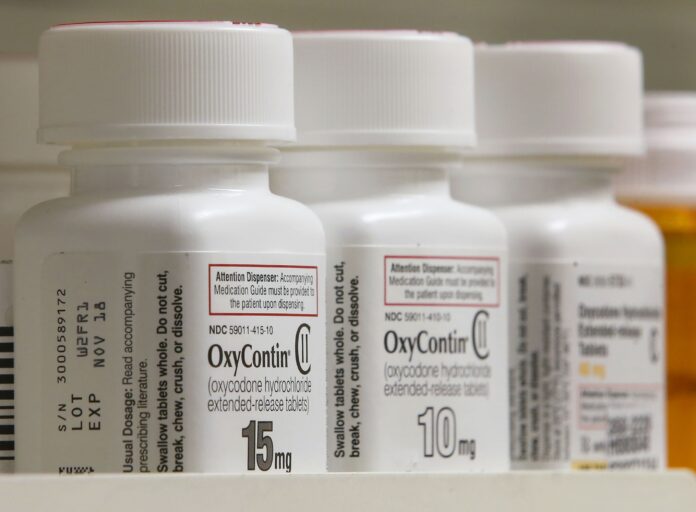
NEW YORK – Purdue Pharma LP’s settlement talks over the drugmaker’s opioid painkillers have stalled over how much money the family that owns the company is willing to pay, according to people familiar with the negotiations.
The Sacklers, Purdue’s owners, have rejected demands by state attorneys general that they guarantee $4.5 billion as part of a broader settlement of claims that the company illegally marketed the addictive medicines, the people said, asking not to be identified because the negotiations are confidential.
The family and executives prefer an earlier proposal – which came out of a meeting in Cleveland last month with state AGs and lawyers for local governments suing over the opioid epidemic – calling for the family to pay $3 billion as part of settlement, the people said, at least partly generated from the sale of corporate assets overseas. Talks will continue this week, they added.
The last-minute bargaining over the settlement has put at stake billions of dollars that more than 2,000 states, cities and counties are seeking in order to recoup the costs of the opioid epidemic. The Sackler family’s contribution has been a key point of contention as a major trial approaches next month.
AG letter
Tennessee Attorney General Herbert Slatery and North Carolina Attorney General Josh Stein, two of the talks’ leaders, sent an email this weekend, seen by Bloomberg News, to other state attorneys general. Slatery and Stein told other AGs that the Sacklers had rejected various proposals that included upping the family’s guaranteed contribution to $4.5 billion.
“The Sacklers refused to budge,” Slatery and Stein wrote Saturday. “We are sorry to report that we have been informed by counsel for the Sacklers that the family has rejected both of our proposals and have declined to offer any counter-proposal.”
“As a result, the negotiations are at an impasse, and we expect Purdue to file for bankruptcy protection imminently,” the state officials said.
Davidson Goldin, a spokesman for portions of the Sackler family, declined to comment on the talks. A representative for the other side of the family, Bob Rendine, didn’t immediately respond to a request for comment.
The people said another group of attorneys general sent out a subsequent letter urging their colleagues to reconsider the so-called Cleveland deal, which only obligates the family to pay $3 billion. The letter said that the Cleveland deal offers more money to beef up treatment and policing budgets than could be obtained in a regular bankruptcy case.
The company disputed reports that settlement talks had fallen apart.
“We have been actively working with numerous state attorneys general and other plaintiffs on solutions that have the potential to save tens of thousands of lives and deliver billions of dollars to the communities affected by the opioid-abuse crisis,” Josie Martin, a Purdue spokeswoman, said in an emailed statement Sunday. “Those negotiations continue and we remain dedicated to a resolution that genuinely advances the public interest.”
Bankruptcy
Whether or not a deal is reached, Purdue intends to file for bankruptcy protection sometime around mid-to-late September, the people said. The company’s Chapter 11 filing would either facilitate a settlement or sidestep the litigation while it reorganizes, they added. A deal to settle the lawsuits would only cover Purdue and the Sacklers, not other opioid makers and distributors.
The federal trial in Cleveland next month will be the first to hear claims by more than 2,000 U.S. cities and counties that Purdue and other drugmakers fueled an opioid crisis that kills more than 100 Americans daily.
In court filings, Massachusetts Attorney General Maura Healey has accused members of the Sackler family of pushing Purdue executives to wrongfully market OxyContin for unapproved uses. “Eight people in a single family made the choices that caused much of the opioid epidemic,” Healey argues.
Almost 400,000 people died from opioid overdoses in the U.S. from 1999 to 2017, according to the U.S. Centers for Diseases Control and Prevention. While fatalities from prescription pills have leveled off, deaths from illegal heroin and synthetic opioids have skyrocketed.
The case is In Re National Prescription Opioid Litigation, 17-md-2804, U.S. District Court, Northern District of Ohio (Cleveland).
Jef Feeley and Katherine Doherty are reporters for Bloomberg News.












